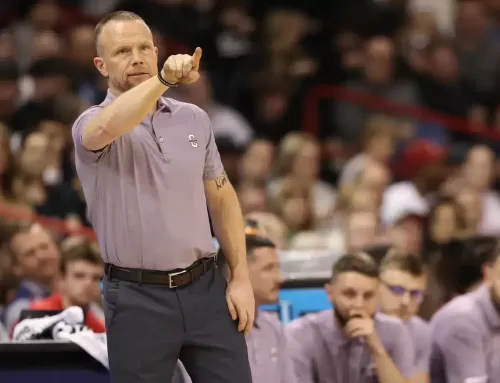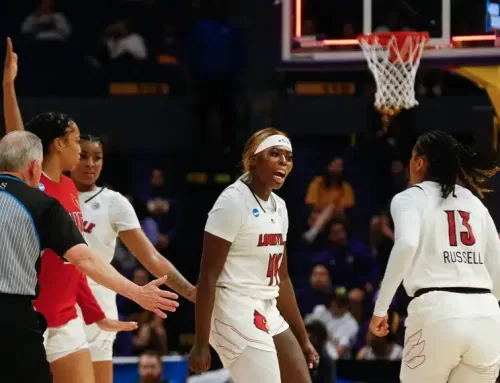Documents from a Dec. 17 report by outside investigator Tom Williams reveal that Vice President for Human Resources Sam Connally’s termination, which became official on Dec. 18, came after a long history of inappropriate behavior by Connally.
The Cardinal received this report through an open records request to U of L.
The report includes seven instances of conflict involving Connally, who held his position as vice president for human resources since 2010.
The investigation came about when Malinda Durbin, an HR employee, retired from the university in the form of a long letter criticizing Connally and Mary Elizabeth Miles, a director in human resources. The Provost, Shirley Willihnganz, immediately called for an internal investigation.
Connally quickly replied and interacted with Durbin, and filed a counter-complaint with the the Provost. The way he went about this was deemed inappropriate by Williams in the “Conclusions” section of his report.
On Oct. 2, 2014, Connally filed a complaint against the Provost, which accused her of treating him with animosity and hostility.
The complaint specifically pointed to three things: the lack of necessity for an investigation into Durbin’s retirement, a deal with Humana involving a potential donation in 2012 and the handling of EEO reports which found race discrimination. However, the evidence presented by Williams serves to discredit the complaints.
Connally claimed that they were given special treatment because of a potential donation by David Jones, Sr. However, Williams notes that Humana did not end up receiving the bid to be the health care provider. According to the report, Connally waited two years to report concerns about the bidding process with Humana, despite university policy requiring immediate action.
The claims about the Provosts involvement in the EEO reports are also exaggerated, says the Williams report. The Provost had “limited involvement” and all the claims were resolved. Also, Connally waited over a year to file this complaint.
According to Williams, “it is apparent from the record that Connally makes his allegations against the Provost when he knows his job is in jeopardy.”
Connally filed the complaint on behalf of Miles, who denied any desire to file a complaint against the Provost, and is said to have taken a cooperative approach in her interview.
Williams concluded that Connally lived up to the reputation for poor judgment and intimidation reflected in the 360 review of him.
In addition, he concluded that the Provost did not engage in inappropriate behavior.
As for the necessity of the investigation into Durbin’s retirment, past evidence of issues shows potential justification for looking into Connally’s behavior.
In 2011, the Provost addressed communication issues and they agreed to code words that could be used by the Provost to help Connally in developing relationships.
In Feb. 2012, a staff member filed a complaint with the provost about being disrespected by Connally.
In Sept. 2012, in an email with the subject line “Re: Need help!”, an HR employee wrote “I DO NOT feel safe in Sam’s presence and am fearful of imminent danger to my safety and well-being. I have no choice but to protect myself from Sam’s toxic, abusive leadership immediately.” This was after Connally threatened to punish the employee for not keeping him informed about an initiative she was working on with the President’s office.
In Jan. 2013, an employee contacted the Provost about Connally acting inappropriately by involving himself in a dispute between her and her ex-husband over tuition remission for their son. He allegedly damaged her relationship with her son and ex-husband.
In response to this, the Provost ordered a 360 review, which is a collection of interviews with Connally’s coworkers, in order to assess his issues. The names of those interviewed were redacted from the document.
The review contains highlights many positives of his tenure, such as his energy, intelligence, ability to enact change and his verbal communication skills. However, the negatives stand out in the report.
He is said to exercise poor judgement, treat people disrespectfully and be overly-controlling of situations.
According to one anonymous quote, “he is interested in pursuing his own judgement on what is the right course of action rather than what he is directed to do.”
Another claims that “he has the ability to squash people and good professional people who made contributions to the university have left because of him…He targets people. I have seen it several times with several different people.”
These reports leave Williams questioning his behavior as vice president for human resources.
“He is in HR and I expect him to be the model for how you treat people,” says one interviewee.
In Aug. 2014, Interim University Counsel Dana Mayton received a complaint about alleged bullying by Connally from Associate University Counsel Amy Shoemaker.
On Nov. 21, 2014, after the Williams investigation was begun, Connally failed to participate in an interview because he was not allowed to bring an unidentified personal adviser into the meeting. Williams told Connally that an adviser, who would be anonymous in the report, could be permitted for the discussion of the Durbin complaint, but that he would have to identify himself to Williams and sign a statement. Connally refused this compromise.
Connally claimed to be protected by university policy; however, he is governed by Redbook section 2.3, which states that all grievance policies are decided by the President.
Connally also complained that Williams had a conflict of interest, because he was contracted by Mayton, who is given direction by the Provost. He also accused Williams of mistreatment when he came into his office.
Williams released his report, citing the need to prevent further delay.
On Nov. 26, five days after the interaction with Williams, President Ramsey informed Connally that he was terminated. On Dec. 18, the Board of Trustees approved this decision.





